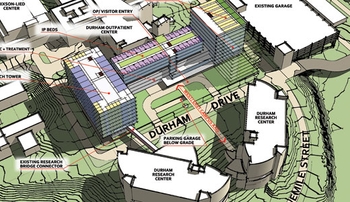In the coming weeks, the Nebraska Legislature’s Appropriations Committee will debate its preliminary budget recommendations and possible support of four University of Nebraska projects.
Under their proposed University of Nebraska’s “Building a Healthier Nebraska” initiative, NU leaders seek a one-time allocation of $91 million from the state’s cash reserve to support capital projects in Omaha, Lincoln and Kearney that will improve health care, drive workforce development and job creation, and create new opportunities for students in health fields across Nebraska.
“We will continue to explain how important these projects are, not only to the medical center, but more importantly, to all Nebraskans,” said UNMC Chancellor Harold M. Maurer, M.D.
The four bills that compose the initiative
On Thursday, the Appropriations Committee will hear testimony on the four bills that make up the University of Nebraska’s “Building a Healthier Nebraska” initiative. The projects, and their legislative bill numbers, are:
- LB 1055 — Construction of an expanded facility for health science education at the University of Nebraska at Kearney that would house nursing and an expansion of allied health programs;
- LB 1065 — Construction of a new facility for the UNMC College of Nursing-Lincoln Division;
- LB 1066 — Construction of a new veterinary diagnostic center at the University of Nebraska-Lincoln’s Institute of Agriculture and Natural Resources; and
- LB 1089 — Construction of a research tower that will be part of a proposed comprehensive cancer center on the UNMC campus in Omaha.
After Thursday
After Thursday’s hearings, the Appropriations Committee will continue deliberations to determine the level of funding it will propose to the full legislature for debate. The four bills are among several bills and agency requests that are before the committee this year.
“If they concur, employees may inform senators of their support for these projects and the impact they will have for all Nebraskans,” said Bob Bartee, vice chancellor for external affairs.
How to support the initiative
Employees and students who want to do so must contact state senators on their own time and without using university resources (computers, telephones, letterhead or university accounts).
See how to contact members of the Appropriations Committee.
Identify the legislative district you live in and the state senator who represents you.
